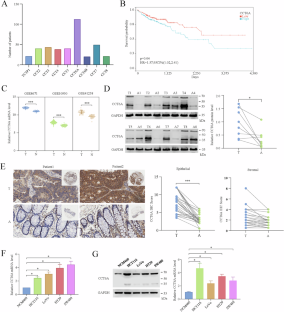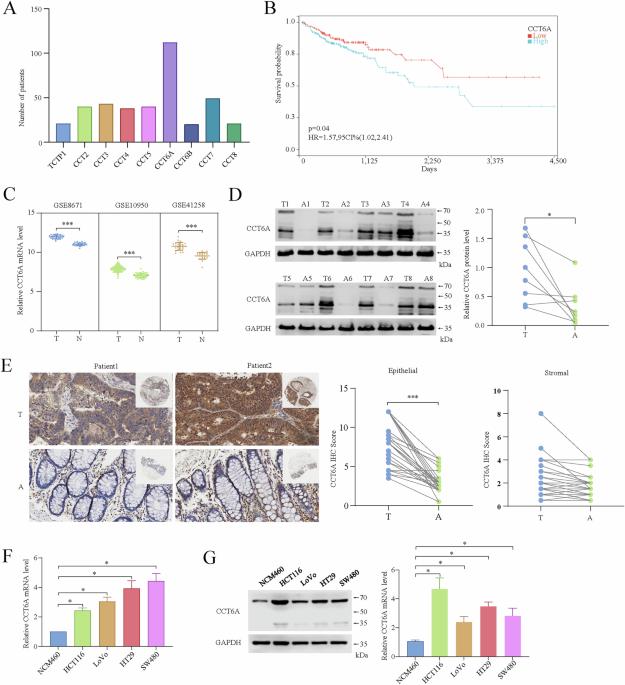CCT6A promotes cell proliferation in colon cancer by targeting BIRC5 associated with p53 status
IF 4.8
3区 医学
Q1 BIOTECHNOLOGY & APPLIED MICROBIOLOGY
引用次数: 0
Abstract
Chaperonin-containing TCP1 (CCT) is a multi-subunit complex, known to participate the correct folding of many proteins. Currently, the mechanism underlying CCT subunits in cancer progression is incompletely understood. Based on data analysis, the expression of CCT subunit 6 A (CCT6A) is found higher than the other subunits of CCT and correlated with an unfavorable prognosis in colon cancer. Here, we find CCT6A silencing suppresses colon cancer proliferation and survival phenotype in vitro and in vivo. CCT6A plays a role in cellular process, including the cell cycle, p53, and apoptosis signaling pathways. Further investigations have shown direct binding between CCT6A and both Wtp53 and Mutp53, and BIRC5 is found to act downstream of CCT6A. The highlight is that CCT6A inhibition significantly reduces BIRC5 expression independent of Wtp53 levels in Wtp53 cells. Conversely, in Mutp53 cells, downregulation of BIRC5 by CCT6A inhibition mainly depends on Mutp53 levels. Additionally, combined CCT6A inhibition and Wtp53 overexpression in Mutp53 cell lines effectively suppresses cell proliferation. It is concluded CCT6A is a potential oncogene that influences BIRC5 through distinct pathways in Wtp53 and Mutp53 cells.


CCT6A 通过靶向与 p53 状态相关的 BIRC5 促进结肠癌细胞增殖。
含伴侣素的 TCP1(CCT)是一种多亚基复合体,已知可参与许多蛋白质的正确折叠。目前,CCT 亚基在癌症进展中的作用机制尚不完全清楚。根据数据分析,CCT 亚基 6 A(CCT6A)的表达高于 CCT 的其他亚基,并且与结肠癌的不良预后相关。在这里,我们发现沉默 CCT6A 可抑制结肠癌在体外和体内的增殖和生存表型。CCT6A 在细胞过程中发挥作用,包括细胞周期、p53 和细胞凋亡信号通路。进一步的研究表明,CCT6A 与 Wtp53 和 Mutp53 直接结合,并且发现 BIRC5 在 CCT6A 的下游发挥作用。亮点在于,在 Wtp53 细胞中,抑制 CCT6A 可显著降低 BIRC5 的表达,而与 Wtp53 的水平无关。相反,在 Mutp53 细胞中,CCT6A 抑制对 BIRC5 的下调主要取决于 Mutp53 水平。此外,在 Mutp53 细胞系中联合抑制 CCT6A 和过表达 Wtp53 能有效抑制细胞增殖。结论是 CCT6A 是一种潜在的致癌基因,在 Wtp53 和 Mutp53 细胞中通过不同的途径影响 BIRC5。
本文章由计算机程序翻译,如有差异,请以英文原文为准。
求助全文
约1分钟内获得全文
求助全文
来源期刊

Cancer gene therapy
医学-生物工程与应用微生物
CiteScore
10.20
自引率
0.00%
发文量
150
审稿时长
4-8 weeks
期刊介绍:
Cancer Gene Therapy is the essential gene and cellular therapy resource for cancer researchers and clinicians, keeping readers up to date with the latest developments in gene and cellular therapies for cancer. The journal publishes original laboratory and clinical research papers, case reports and review articles. Publication topics include RNAi approaches, drug resistance, hematopoietic progenitor cell gene transfer, cancer stem cells, cellular therapies, homologous recombination, ribozyme technology, antisense technology, tumor immunotherapy and tumor suppressors, translational research, cancer therapy, gene delivery systems (viral and non-viral), anti-gene therapy (antisense, siRNA & ribozymes), apoptosis; mechanisms and therapies, vaccine development, immunology and immunotherapy, DNA synthesis and repair.
Cancer Gene Therapy publishes the results of laboratory investigations, preclinical studies, and clinical trials in the field of gene transfer/gene therapy and cellular therapies as applied to cancer research. Types of articles published include original research articles; case reports; brief communications; review articles in the main fields of drug resistance/sensitivity, gene therapy, cellular therapy, tumor suppressor and anti-oncogene therapy, cytokine/tumor immunotherapy, etc.; industry perspectives; and letters to the editor.
 求助内容:
求助内容: 应助结果提醒方式:
应助结果提醒方式:


